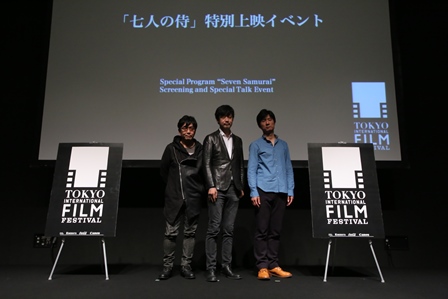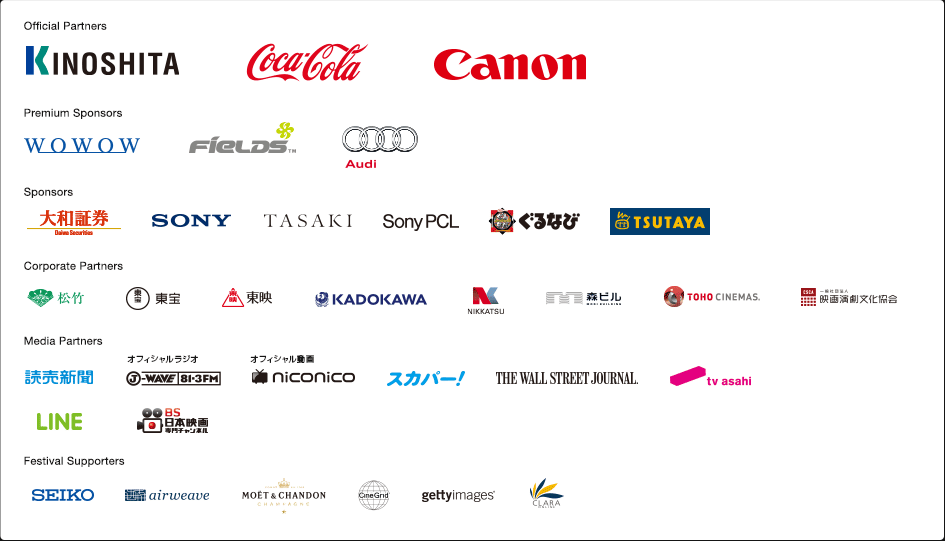
Anyone who thinks Japan’s film industry isn’t filled with the kind of talent that propelled it to the forefront of world cinema after World War II needs to take another look at the work of TIFF’s so-called Seven Directors: Eiichiro Hasumi, Takashi Miike, Tetsuya Nakashima, Keishi Otomo, Sangil Lee, Takashi Yamazaki and Daihachi Yoshida. Together, these men, most still in their early 40s, are responsible for a diverse and sometimes boundary-pushing body of films, all created in the last few decades and all lauded internationally.
If you haven’t heard their names, you’ve seen some of their heralded work, from the gonzo stylings of Miike, who’s made over 80 films including 2012’s Hara-Kiri: Death of a Samurai; to the remake of Clint Eastwood’s Unforgiven, starring Ken Watanabe (2013, Lee); to the Oscar-shortlisted Confessions (2010, Nakashima); to the Umizaru series (Hasumi); to last year’s biggest money earner, The Eternal Zero (Yamazaki); to this year’s twin megahits, Rurouni Kenshin: Kyoto Inferno/The Legend Ends (Otomo); and the multi-award-winning The Kirishima Thing (2013, Yoshida), which the director has followed up with Pale Moon, the only Japanese film in this year’s TIFF Competition Section.
Selected by TIFF to showcase the continued excellence of Japanese film, the Seven Directors were named to mark the 60th anniversary of Akira Kurosawa’s Seven Samurai, the Toshiro Mifune starrer that won the Venice Film Festival’s Silver Lion Award in 1954 and continues to rank No. 1 in many global surveys of the best films of all time.
Sangil Lee, Keishi Otomo and Takashi Yamazaki were on hand to represent the members of the group at a special talk event preceding a screening of Kurosawa’s masterpiece on October 26. They began by discussing the great director’s ongoing legacy, comparing his challenges to their own. They immediately remarked on Kurosawa’s “selfishness” — his fights with the studio, his demands, his refusal to compromise the integrity of his films.
As Otomo (Rurouni Kenshin, Platinum Data) marveled, “Mr. Kurosawa was making period films, and it’s very difficult to recreate the costumes, mannerisms, behaviors and movements. He told actors to always be in costume, in character. His obsession with realism extended to the camerawork. So what’s on the screen feels authentic, not fake. But he had enough time to prepare. Today it’s not possible.”
Lee (Unforgiven, Villain, Hula Girls), relating an anecdote about Kurosawa using real arrows in the final attack on Toshiro Mifune in Throne of Blood (Kumonosu-jo), said that considering the level of authenticity achieved, “I think I should be selfish, too.” Yamazaki interjected: “You are.” Lee: “No, I’m not. I mean, sometimes I change the script the day before shooting – if you call that selfish.”
Otomo, who studied filmmaking in Los Angeles, admitted that he was known for fighting for his demands, but noted, “Filmmaking is mostly led by producers these days, so we need to compromise on the business side of it. Knowing when to compromise and being canny about it is important. In Mr. Kurosawa’s day, the industry itself was [more supportive] of filmmakers. Japanese films were rich in content, titles and genre.”
Yamazaki (Parasyte, Always – Sunset on 3rd Street, The Eternal Zero) mentioned that today’s filmmakers do have the advantage of deploying digital technology. “They used to do outrageous things. Like for High and Low, Mr. Kurosawa wanted three different villages. Nowadays we can use CG, but when he demanded villages, they had to build them.”
Said Lee: “Basically, we’re all freelance filmmakers today, unlike in the days of the studio system. So we can’t just fight, we need to be sure exactly what we need to create.”
Lamenting the relatively small global audience for Japanese films, Yamazaki said, “Unless you have a Bruce Lee-caliber star, I think Galapagos [Japan’s isolated market] is fine. I don’t spend time worrying about my films going abroad, even though the foreign market is appealing. But I think only CG movies can break through.”
Otomo, whose Rurouni Kenshin series notched huge overseas sales, added, “The domestic market is limited, so if I can imagine an overseas audience, [it helps me] dive deeper into my creativity.”
























